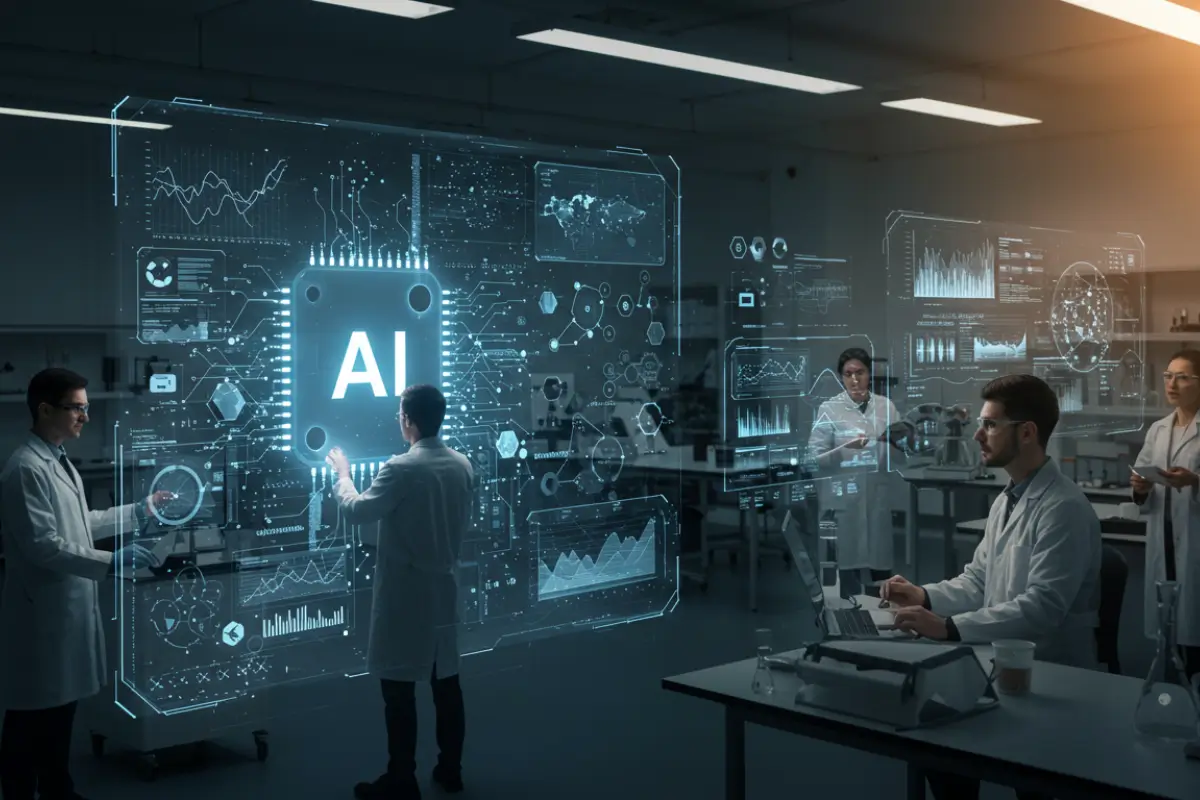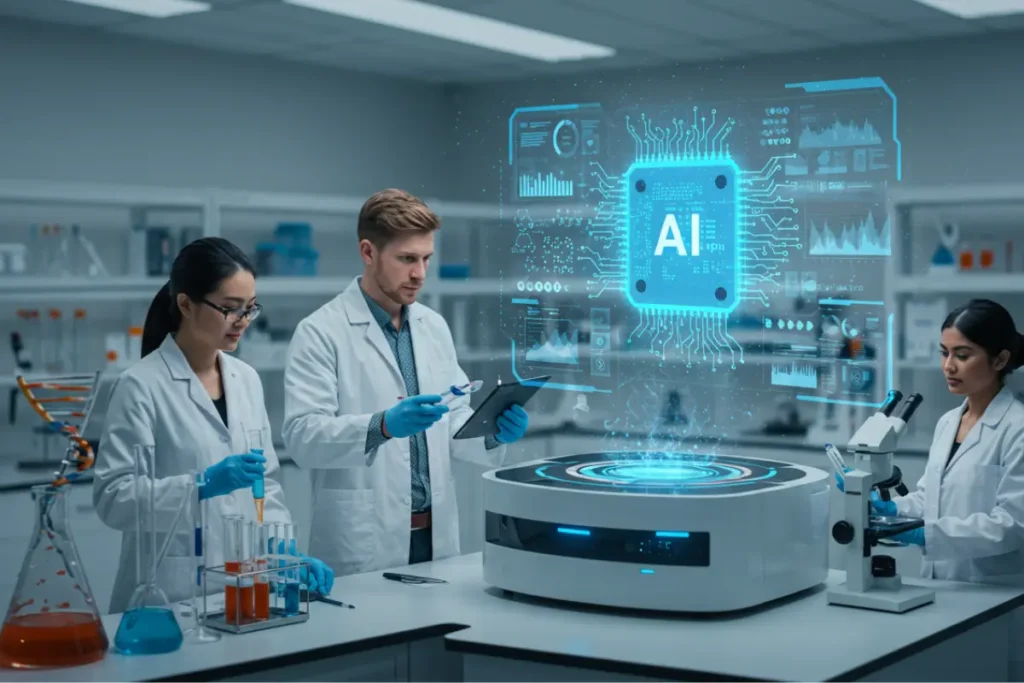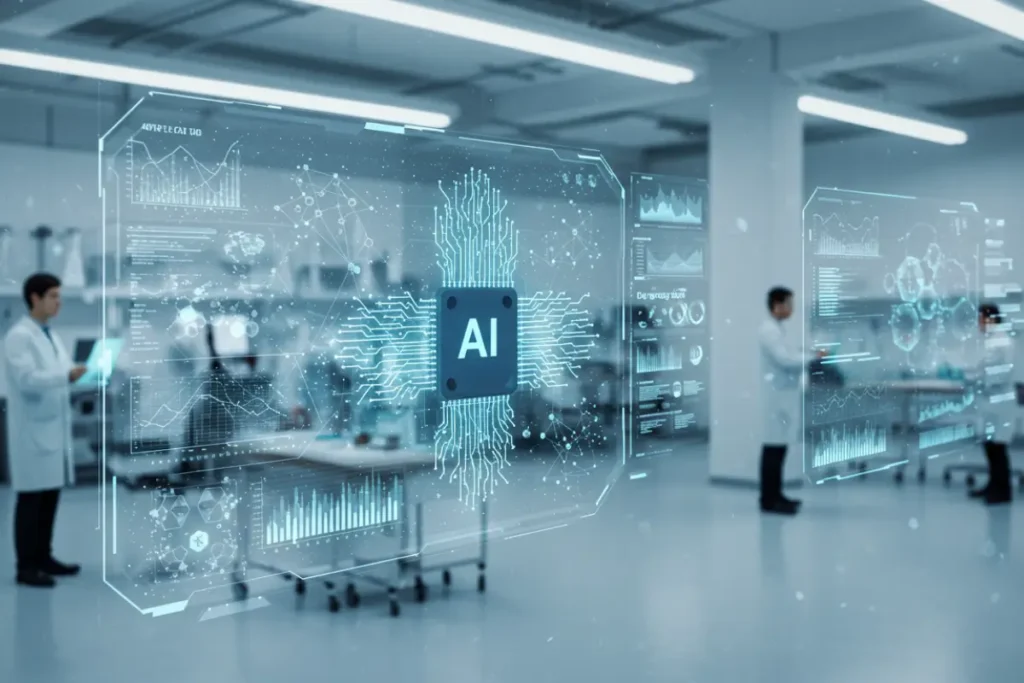AI in Science – Making Discoveries Faster Than Humans
- April 14, 2025
- 0
Imagine a world where scientific breakthroughs are no longer limited by human speed or memory… Well, that future is now – and it’s being powered by Artificial Intelligence
Imagine a world where scientific breakthroughs are no longer limited by human speed or memory… Well, that future is now – and it’s being powered by Artificial Intelligence

Imagine a world where scientific breakthroughs are no longer limited by human speed or memory… Well, that future is now – and it’s being powered by Artificial Intelligence (AI).
Every day, I find myself more amazed at what AI can do, and nowhere is that clearer than in the world of science and research.
From space exploration to disease diagnosis, AI is revolutionizing science at a pace we’ve never seen before. And let me be honest with you – it makes me feel like we’re living inside a sci-fi movie.
Let’s say more about this world of algorithms, discoveries, and super-fast breakthroughs, and I’ll show you why AI in science might be the most exciting thing happening today.
🧠 Quick Tip: If you’re curious about how AI is helping in the world of languages, check out my article on How AI is Helping Preserve Endangered Languages

For decades, scientists have relied on long hours in the lab, endless pages of notes, and years of trial-and-error to make breakthroughs. But with AI, research no longer moves at a snail’s pace.
AI can read thousands of studies in seconds, spot patterns in massive datasets, and even predict the outcomes of experiments before they’re done. It’s like having the smartest, fastest-thinking research assistant in the universe.
I personally think that the biggest game-changer is how AI helps connect the dots that humans often miss. Sometimes we just can’t see the bigger picture, especially in areas like genomics or quantum physics, where the data is too huge to handle manually.
AI helps us by:
⭐ Example: Scientists recently used AI to discover a new antibiotic called Halicin – something humans failed to find for years. You can read more about it on MIT News.
One of the most fascinating parts of this AI revolution is in healthcare. It’s a topic that hits close to home for many of us, and AI is already saving lives.
Just think about this: AI can look at your MRI scan, blood test, or x-ray, and detect illnesses like cancer or Alzheimer’s with better accuracy than many doctors.
As someone who believes in combining technology with compassion, this honestly gives me a lot of hope.
Some amazing uses of AI in medicine include:
And this is just the beginning. We’re seeing AI-powered surgeries, robotic medical assistants, and even chatbots that help with mental health. One day, AI might even help us live longer – maybe much longer.

📈 Visual Boost:
AI Task Human Time AI Time Reviewing 10,000 papers ~2 years ~10 minutes Identifying rare disease weeks seconds Drug discovery cycle 10+ years <2 years
📅 Related Read: Explore the future of AI in medicine through this detailed article by the National Institute of Health
Have you ever looked up at the night sky and wondered what else is out there? Well, AI is helping us answer that question faster than ever.
Space agencies like NASA and SpaceX are using AI to navigate spacecraft, analyze space signals, and even search for extraterrestrial life. I find this absolutely mind-blowing. With the universe being so gigantic, AI helps make sense of the chaos.
Ways AI is revolutionizing space science:
And who knows? Maybe one day AI will build a civilization on Mars – a topic I talk about in this futuristic article.
🌍 Don’t miss this external gem: NASA’s AI-powered Mars rover missions
Here’s a list of the top areas in science where AI is already outperforming humans and speeding up discoveries:
🚀 Want to see AI in action in the environment? Check out this post on my blog – it’s one of my favorites.

There are moments when I read these stories and I feel something deep inside – a sense of awe. I really believe AI is the next phase of human evolution, at least in how we explore and understand the world around us.
In fact, I think the future of science won’t just be done by humans. It will be a collaboration between brilliant minds and intelligent machines.
We’re talking about a partnership that could solve some of the world’s hardest problems: climate change, pandemics, energy crises, and even space colonization.
Of course, there’s still a long road ahead. We need to ensure that AI is used ethically, and that we keep humans at the center of every discovery. But still, the potential is undeniable.
🔗 Also, if you’re passionate about tech, check out my article on The Rise of AI-Powered Supercomputers
We’re not just talking about small improvements – we’re witnessing a full-blown transformation. AI in science means we’re moving faster, thinking deeper, and reaching farther than ever before.
I personally believe we’re only scratching the surface. The coming years will show us discoveries we never thought were possible, and AI will be behind most of them. It’s up to us to guide it the right way.
And I also believe a lot in human evolution after AI.
If you liked this article, don’t forget to share it with your friends, leave a comment below telling me what scientific field excites you the most.
🔗 If you’re still curious, see a deeper dive into how AI is changing our evolution in this amazing external article from Scientific American.